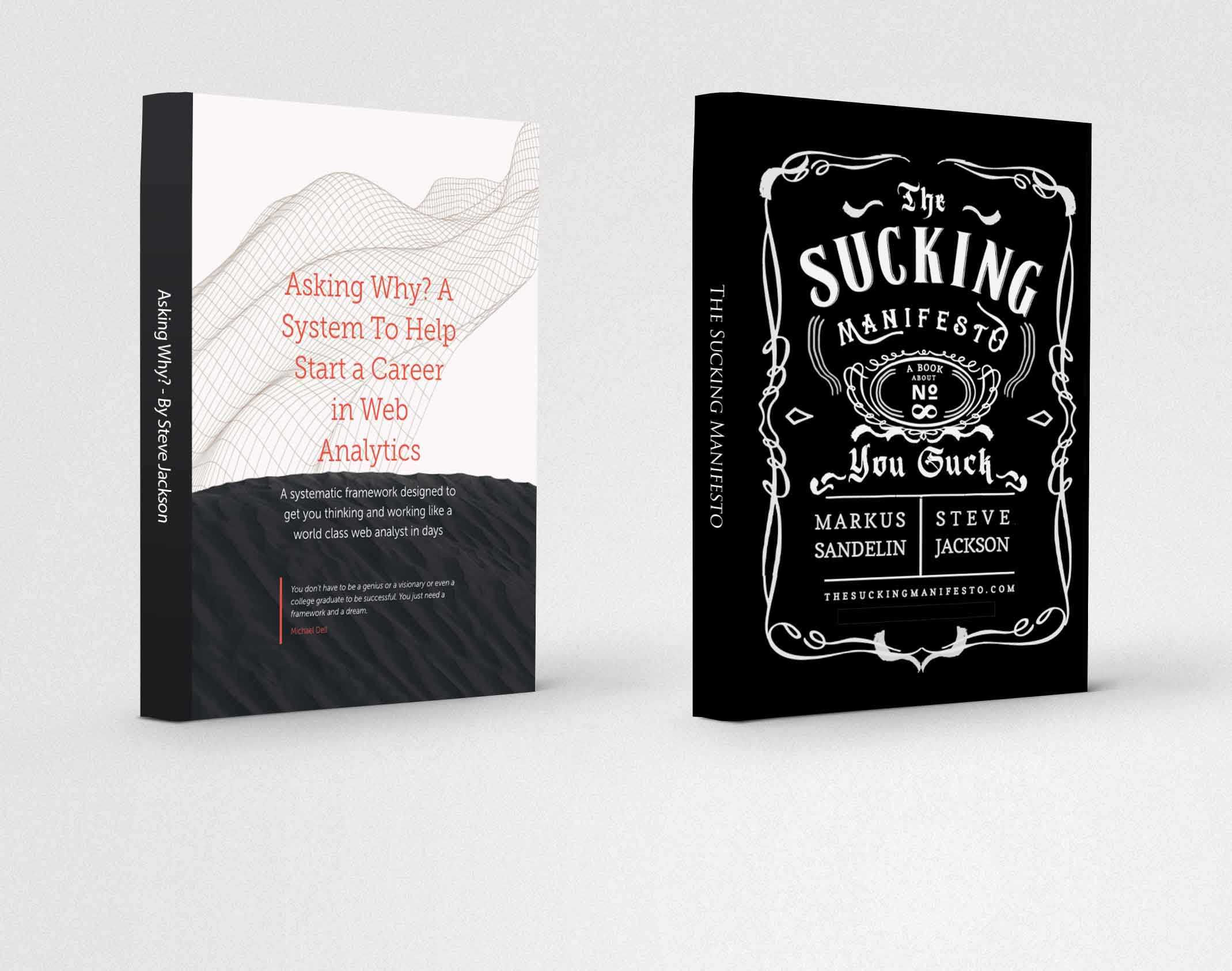The Sucking Manifesto
Penn Jillette did a great sketch in their show "Bullshit!" about how people see numbers. We won't go into the details, but the essence was that we don't actually use numbers that much. Instead, we quantify amounts in more understandable measures: a few, some, a bunch, a load, a shit-load and we are sure that this is similar in almost any language and it applies for many other physical measurements like weight and height.
It's easy to understand ten apples, even a hundred apples, but with the digital age, we're bombarded with so much pointless information that we assume we need a Carl Sagan-like brain to understand every single calculation.

Who Am I?
Neither of the authors of this book are rocket scientists so we believe that anyone can do what we're about to show you. Because of all the pointless information and the rapid progress of technology, we end up in a situation where we are now: Lost. It's quite simple....
If we don't understand the numbers, we lose interest.
When we lose interest, we become mentally disabled and we start making decisions that suck.
We don't have simple-enough techniques to make what we're doing understandable, and yes we, the industry, are not helping.
We (the authors) have been measuring user behaviour for decades, we have the tools that are packed full of a wealth of data and insights. Yet we suck at communicating what we find, communicating what were doing whilst also building a process to take action.

The Problem
That's when it becomes hard
Don't believe me yet? Well, "We", the marketing industry do suck at this stuff generally. In decades of working with blue-chip clients in numerous countries, the authors have both seen that most companies pretty much suck. There's no argument about that, it's all about the magnitude of denial. In some drug or alcohol programs, they say that the first step towards healing is agreeing there is a problem. To help, we made you a list.
We suck because we don't set good goals and objectives
You want more revenue? More sales? More visits on your site? More salary? Lose weight? Well, how much? Even more, how much is it worth to you and how much are you willing to spend on it?
We suck because we spend bucket loads of cash on getting eyeballs
Why do website owners spend buckets of cash promoting poor websites without a thought to their target audience? They pay for traffic, but they sure don't pay for science.
We suck because we use numbers as an emotional crutch
How many discussions end with every participant blissfully happy in their ignorance, thinking the numbers someone just muttered actually meant something? How often have we been patting each other on the shoulder because our "viral" video got ten thousand views? When did we start believing the lie?
We suck because we communicate like a bunch of nerds
Albert Einstein famously said that, "If you can't explain it simply, you don't understand it well enough." The online industry has been at the forefront of this for ages.
We suck because we don't get the Hippos working for us
The HiPPO is a commonly used abbreviation that stands for the Highest Paid Persons Opinion. We suck because we think this guy doesn't understand that what we're doing is great work and he makes gut decisions rather than have data-informed opinions. The reason in most cases they don't understand is because we communicate like nerds.
We suck because we live in a goldfish bowl
The web analytics silo, the business silo, the CRM, or other sales & marketing systems are all disconnected and in different departments. IT is building systems for finance, while marketing is scheming to replace IT with a cloud service. Meanwhile finance is planning to outsource marketing to Latvia.
We suck because we're not building a house, we're polishing our hammer
We're obsessed with the perfect implementation of tools. We are the kind of people who go out to buy everything our new hobby or sport needs in the first day. We want to know what the eVar does and how the s.prop works. Were you at that conference about the tool that will make squirrels speak german? We need that.
We suck because we don't do things today
"We have a lot of things going on", we say to ourselves. "I don't have time to do it today, I'll do it tomorrow," we hear ourselves mumble.
We suck because we fail at the basics
There are a lot of basic mistakes we've seen. Banners sending 6 hits instead of 1 to the analytics server every time someone landed on the page. Basically that meant it looked like you had 6 times as many visitors. We've seen 30 odd countries sending traffic to 5 different shopping carts and wonder why the numbers were different across different systems. We've seen websites not tagged, URLs not tagged or if they were tagged then they were tagged incorrectly.
We suck because we are losing confidence in numbers
We are the boy who cried conversion rate. Not only is our day and age full of information, it is also full of numbers. Data has changed from a privilege into a burden. Fortunately, we have all the tools required to collect, handle and store this data. We even have some people who know how to use and present it. Unfortunately, we have too many people who don't know how to use and present the data.
As an Example
I had a client called Michael who asked me quite casually to look at a Powerpoint presentation that was sent to him by his colleagues from America. He worked for a big global company that sold hand-held multi-media devices to consumers all over the world. It was so successful they had large advertising budgets and the Powerpoint I was had received had the breakdown of media money the company was spending on various different reach channels.
Michael just said to me, "can you have a look at this and let me know your opinion, are we overspending here or under spending? this is a sales campaign to our eCommerce store".
I dug into the data in the slides.
There were a lot of cost metrics, things like cost per thousand impressions of a banner ad (CPM) and cost per click (CPC) of the various reach sources.
Clicks or visits on their own don't put anything into context. In order to answer Michael's question, I had to know how many of the clicks we could estimate would result in a sale. After all, how can you know if you are under or overspending if you don't know what the end result is in terms of revenues and return on advertising spend?
The first big thing I learned by looking at the context of the campaign was that people were abandoning the website shopping cart at 98%. The campaign overall cost was $2million and they expected to drive 50,000 visitors to the website. The profit margin of the product being sold was $60.
Simple Maths
Simple maths dictated that the best expectation of profit we could produce was $60,000 from a campaign spend of $2 million. When I told Micheal he was delighted because not only had we just saved him $2 Million the company changed its process so that this didn't happen again.
The problem was that the communication the US team running the campaign had employed was misleading unless you knew what every metric meant and could put the whole thing into context, which was that in this case the website sucked and the cost of each campaign was way too high.
The Solution
You can learn from how we sucked!
We wrote a book about how not to suck at marketing
The first time we discussed this book in our beloved home away from home, a quaint pub in the heart of Helsinki, Finland, we spoke of these things. I've always appreciated those sessions with the people in there since it's never been an industry meet-up or a networking thing. It's just been mates having a beer and talking about stuff we really, really like. Like beer, fishing and sometimes analytics.
The idea came when Markus said, "I wish there was a scientific way to do marketing". This led to a lengthy debate, which continued even when the bar staff brought out the malt whisky (the inspiration behind our book cover). Steve argued there was lots of science behind the methods he used to deliver effective online marketing campaigns. Markus argued it was more luck than science and that we largely sucked at it.
What we did both agree on was that there wasn't a simple to follow system or methodology to think about what was good, what was bad and where to start. The other thing we came up with that night was that while we were talking about this one of our other mates, who worked in design was laughing at us saying "what the hell is cpc, cpm, acceleration ratios, bounce rates. It's acronym hell!".
Acronym hell
So here we were talking about developing a simple to use, scientific framework to help people like our design friend understand marketing and analytics when we actually sucked ourselves at the basic thing, communication.
With this in mind when we sobered up, we got to work and produced a system designed to cut through the bullshit in the industry and show a way that is as close to a scientific method to deliver results.
The scientific approach to marketing
Dispelling the myths Like urban legends, there are thousands of false facts, creative truths and blasphemous lies out there about analytics and measuring. We share the five most common ones.
Defining the terms A common language is the best weapon we have against ignorance.
Metrics A list of values and ratios with full explanations taken from industry best practices. Work with terms that professionals work with. We provide our way of calculating these that make sense for your business.
Goals and objectives Your website goals and objectives should tie in very closely to your overall business strategy not be separated from it. We give you the what's what about goals and objectives.
Working out your real costs Before we start working out our costs per acquisition, click calculations and formulas, we show you how to add the business basics that should not be separated from your web strategy.
Benchmarking The right way to do benchmarking isn't just looking at what your competition do. We show you how it can be done with existing data or by starting from scratch.
Customer testing lifecycles When it comes to marketing, we have tons of different life cycles we are dealing with, but often leave unnoticed or neglect to give them the value they deserve. We show you how to define and measure the impact of the different customer types you have.
The Model itself Built around the 25/50/25 rule which is a method that takes the best 25% and the worst 25% as opportunities to improve. Apply this model to your marketing and you can optimise your budgets continuously. The model alone will pay for the Sucking Manifesto many times over.
Defining the value created How much value is each conversion really creating? Even more importantly, where and how is it created? Can we improve it?
Case studies Our model is not just a theory, so we wanted to give you an example of how we have used it in the past. The best thing about our model is that it scales perfectly. Whether you're a one-man show or you have 50,000 employees, it will work.
19 everyday applications The CEO of your company needs different things than the search marketing campaign manager. We show how to use the model in 19 different ways.

But that's not all
So you can simply go and buy the Sucking Manifesto if you'd like as a stand-alone but I'd like to make another offer to you that doubles the value of your investment.
The Sucking manifesto is a systematic way to do marketing, it has everything you need to manage marketing campaigns and systematically improve everything you do.
But what if you're completely new to Analytics? Completely new to using data to your benefit?
That's why today I am offering a bonus book written in December 2021 by Steve Jackson.
Asking Why - A system to help start a career in web analytics
Asking why is a brand new book designed to simplify the process of starting a career in web analytics. When I started out it was by chance, I had no prior experience and I was lucky. This book tells that story and then goes on to show you exactly how you can think like the world-class analysts do today in a systematic framework.
Why give it away?
These books are not about making money really, they're about paying for the work put into them. Neither Steve nor Markus expect or want to get rich off this. We're looking to help educate the market for a very fair price. Hundreds of hours of work went into each book but we'd rather you learn than make huge profits.

What are you waiting for?
Finally, this purchase is risk free
I'm confident that you will get value from these books. I am therefore offering a 100% money-back guarantee that if you are not happy for any reason up to two weeks after purchase, I will refund you in full.
